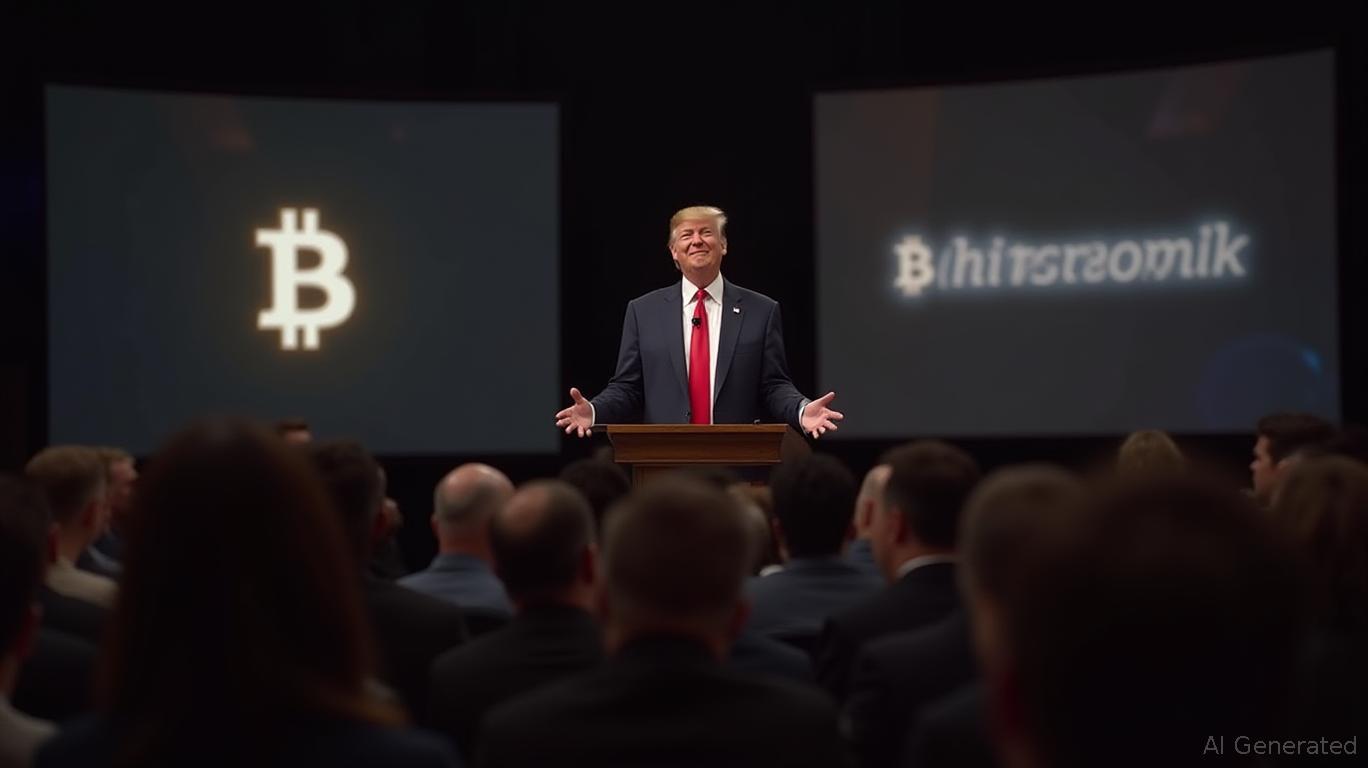Bitcoin News Today: Eric Trump Vows Bitcoin Can Bridge the Wealth Gap—But Can It?
- Eric Trump advocates Bitcoin as an egalitarian financial tool, claiming it offers equal access across socioeconomic groups. - Critics note Bitcoin's benefits remain skewed toward institutional investors, challenging its "equalizer" narrative despite decentralized features. - Generational divides emerge in political attitudes, with younger voters embracing crypto as anti-establishment while older demographics favor regulation. - Global regulators struggle to balance innovation and oversight, exemplified b
The debate over the ethics of immutability in digital finance has taken center stage as cryptocurrencies like Bitcoin increasingly influence political campaigns and public discourse. Eric Trump , son of former U.S. President Donald Trump, highlighted the egalitarian potential of Bitcoin during a speech at the Bitcoin Asia conference in Hong Kong. He emphasized that Bitcoin is the first financial system "agnostic to true wealth," allowing individuals across the socioeconomic spectrum equal access to financial opportunities [1].
Trump’s remarks echoed broader political narratives where digital assets are positioned as tools for financial inclusion and innovation. He contrasted the traditional banking system—often seen as favoring the privileged—with a crypto-driven model that he claims bypasses systemic advantages. “The traditional financial system in the world has benefited guys like me, and it hasn’t benefited the vast majority of people,” he noted [1]. This perspective aligns with a generational divide in political attitudes toward cryptocurrency, where younger voters view it as a mechanism for challenging entrenched financial elites and gaining autonomy.
However, the reality of Bitcoin’s adoption complicates the narrative of universal accessibility. While the technology offers decentralized control and transparency, its benefits are still disproportionately concentrated among institutional investors and early adopters. According to Conrad Young, co-founder of Paragon, the original vision of crypto as a great equalizer is only partially realized. “Some of the decentralized elements of crypto leave fewer levers for wealthy individuals to pull compared to traditional finance,” he stated, acknowledging that institutional recognition of Bitcoin and Ethereum has driven recent market gains more than grassroots adoption [1].
The political implications of this duality are evident in global campaign strategies. In the United States, cryptocurrency has become a wedge issue, particularly among younger voters. Politicians who advocate for pro-crypto policies attract support from Millennials and Gen Z, who view digital assets as symbols of innovation and financial freedom. Conversely, older voters tend to perceive cryptocurrencies as volatile and disruptive, favoring regulation and stability [1].
This generational divide is mirrored in regulatory debates. Governments worldwide are grappling with how to balance innovation with oversight. In the European Union, the Markets in Crypto-Assets (MiCA) framework seeks to provide legal clarity while protecting investors. Meanwhile, in India, the Reserve Bank of India has taken a cautious approach, emphasizing risks to financial stability and monetary sovereignty. These varied strategies reflect broader ideological divides, with progressive leaders advocating for tight regulation and equitable taxation, while conservatives emphasize economic freedom and minimal government intervention.
Cryptocurrency has also introduced new dimensions to campaign financing. The ability to accept digital asset donations has opened up new fundraising channels but has also raised concerns about transparency, foreign influence, and volatility. In the U.S., the Federal Election Commission permits crypto contributions but requires strict reporting standards. Globally, the anonymity and fluctuating value of digital assets pose challenges for campaign finance laws.
The emergence of Central Bank Digital Currencies (CBDCs) further complicates the political landscape. While CBDCs are state-controlled and offer regulatory oversight, they also raise concerns about privacy and surveillance. As governments like China and India test their own digital currencies, the competition between state-backed and decentralized digital assets is shaping political narratives around financial sovereignty and individual autonomy.
Ultimately, the ethics of immutability in digital finance remain a contentious issue. While cryptocurrencies promise to democratize access to financial systems, their current realities highlight ongoing tensions between innovation and inequality. As political campaigns continue to evolve, the role of digital assets will likely remain a key factor in shaping voter behavior and regulatory policies in the coming years.
Source:

Disclaimer: The content of this article solely reflects the author's opinion and does not represent the platform in any capacity. This article is not intended to serve as a reference for making investment decisions.
You may also like
Jensen Huang predicts ‘God AI’ to come in the future
Is This Development Hindering the Upward Trend in the Cryptocurrency Market? Galaxy Digital Analyst Speaks Out
South Korea plans talks with US to exempt Samsung, SK Hynix from Trump’s 25% chip tariffs
Ethereum : Buterin reveals major upcoming reforms
